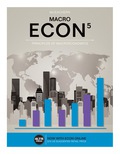
Sub-part
A
The initial effects on bank assets, liabilities, and reserves and assuming a
Concept Introduction:
The Federal Reserve and banking system are responsible for the creation of money in the economy. The first step of this money creation process starts when the Federal Reserve injects money in the economy by buying bonds. This money is stored in a bank. Then, the bank would keep the
Sub-part
B
The initial effects on bank assets, liabilities, and reserves and assuming a required reserve ratio of 0.05 when Fed loans $5 million to a bank.
Concept Introduction:
The Federal Reserve and banking system are responsible for the creation of money in the economy. The first step of this money creation process starts when the Federal Reserve injects money in the economy by buying bonds. This money is stored in a bank. Then, the bank would keep the required reserves with themselves, and lent the remaining excess reserves. These excess reserves will then be stored with some other bank and the other bank would also keep the required reserve and make a loan for the remaining amount. These excess reserves keep flowing in the economy, thus, creating money at every stage. A bank’s balance sheet has the deposit account and capital account on the liabilities side, and cash reserves, required reserves, loans, and securities are on the asset side of the bank’s balance sheet that are affected by the money creation process.
Sub-part
C
The initial effects on bank assets, liabilities, and reserves and assuming a required reserve ratio of 0.05 when Fed raises the required reserve ratio to 0.10.
Concept Introduction:
The Federal Reserve and banking system are responsible for the creation of money in the economy. The first step of this money creation process starts when the Federal Reserve injects money in the economy by buying bonds. This money is stored in a bank. Then, the bank would keep the required reserves with themselves, and lent the remaining excess reserves. These excess reserves will then be stored with some other bank and the other bank would also keep the required reserve and make a loan for the remaining amount. These excess reserves keep flowing in the economy, thus, creating money at every stage. A bank’s balance sheet has the deposit account and capital account on the liabilities side, and cash reserves, required reserves, loans, and securities are on the asset side of the bank’s balance sheet that are affected by the money creation process.
Trending nowThis is a popular solution!




 Economics (MindTap Course List)EconomicsISBN:9781337617383Author:Roger A. ArnoldPublisher:Cengage Learning
Economics (MindTap Course List)EconomicsISBN:9781337617383Author:Roger A. ArnoldPublisher:Cengage Learning
 Economics: Private and Public Choice (MindTap Cou...EconomicsISBN:9781305506725Author:James D. Gwartney, Richard L. Stroup, Russell S. Sobel, David A. MacphersonPublisher:Cengage Learning
Economics: Private and Public Choice (MindTap Cou...EconomicsISBN:9781305506725Author:James D. Gwartney, Richard L. Stroup, Russell S. Sobel, David A. MacphersonPublisher:Cengage Learning





